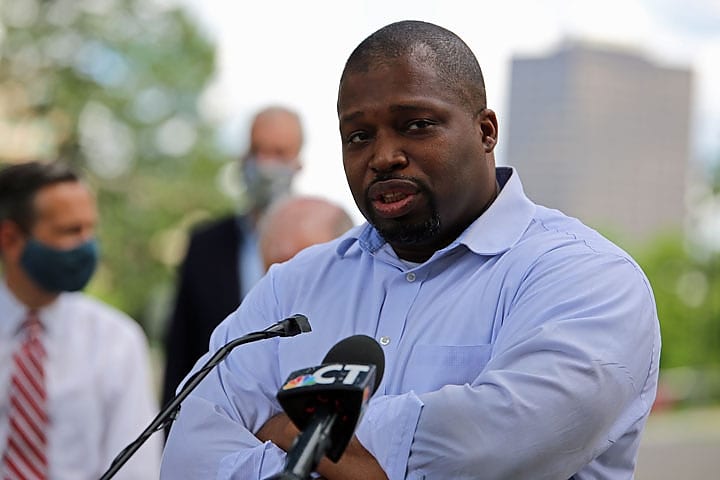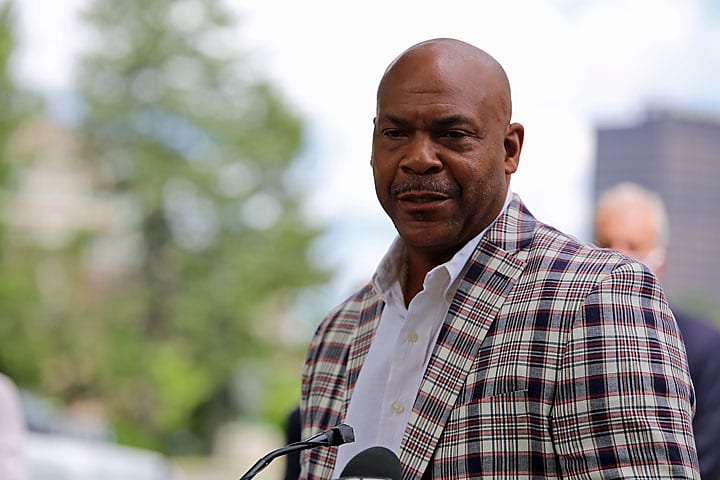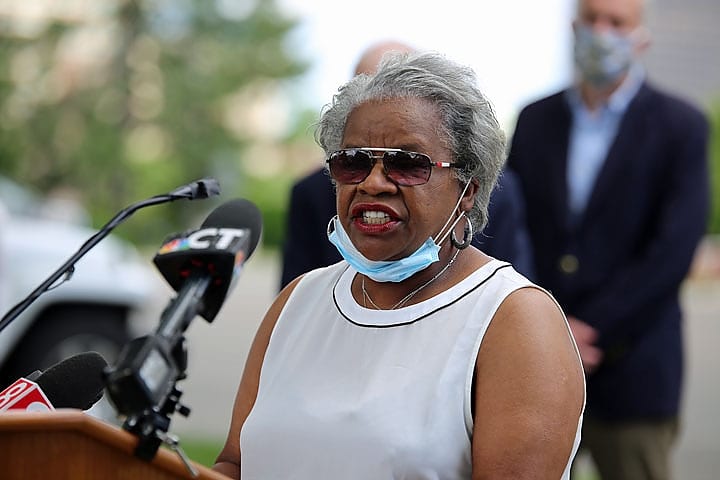Senate Democrats Seek To Expand Agenda For Special Session

Audio By Carbonatix

Black Lives Matter flag flies over the State Capitol. Photo credit: Christine Stuart, ctnewsjunkie.com
State Sen. Derek Slap of West Hartford said what is happening now isn’t just a ‘moment,’ it’s a ‘movement.’

Sen. Derek Slap. Courtesy photo
By Christine Stuart, ctnewsjunkie.com
With the Black Lives Matter flag flying atop the State Capitol for the first time ever, Senate Democrats are looking to seize the moment and the momentum by calling for more than police accountability and absentee ballots to be addressed during a July special session.

Sen. Gary Winfield. Photo credit: Christine Stuart, ctnewsjunkie.com
“Nothing for me is off the table in this discussion,” state Sen. Gary Winfield, D-New Haven, said.
Winfield, who is the co-chair of the Judiciary Committee, has been leading the drive for quick passage of criminal justice and police accountability legislation. While no drafts of the language have been released yet, legislators are looking to:
- Decertify police convicted of misconduct;
- Ban “no-knock” warrants;
- Reform arrest policies in order to curb unnecessary detention; and
- Increase the power of civilian review boards.
He acknowledged that they are really trying to push people out of their comfort zones to pass legislation they might not have been comfortable with passing in a “normal” time.
“If we can’t do it in this day and time, then we’re never going to do it,” Winfield said.
Senate Democrats said they purposely chose Juneteenth, the day commemorating the abolishment of slavery, to announce their agenda – which includes recognizing Juneteenth as a holiday.
“Flying the Black Lives Matter flag over the State Capitol is great. It’s a very important symbolic gesture. But, as one speaker today said, symbols are not enough – we need concrete action and meaningful legislation to address systemic racism and racial inequality,” state Sen Derek Slap of West Hartford, who joined his colleagues in front of the State Capitol to unveil their agenda, said in a statement. “We’ve all seen the rallies happening all across the state. We’ve heard the voice at town halls and on town greens. This isn’t just a moment – it’s a movement. And as elected representatives of the people, we have a duty to act.”
Police accountability isn’t the only issue Senate Democrats are hoping to tackle.

Sen. Doug McCrory. Photo credit: Christine Stuart, ctnewsjunkie.com
Sen. Doug McCrory, D-Hartford, said they also want to take up exclusionary zoning, minority teacher recruitment, and inequality in healthcare.
“These are issues we’ve been talking about for 25 years,” McCrory said. “This is nothing new.”
McCrory said the conversations they’re having about housing is not new.
Connecticut’s exclusionary zoning laws essentially prohibit affordable housing from being built in suburbs and rural towns.
“This is not something new. We all know these facts,” McCrory said.
Winfield said he doesn’t understand how people in Connecticut are allowed to live completely different lives from the majority.
“How have we allowed it that people in our state get to live lives that are completely unrecognizable when you really understand what the lives they live are to the majority of the state,” Winfield said. “I don’t think this is easy. I’m under no false pretense that this is easy, but living the life that people have to live because of policy we’ve done is not easy. It’s not acceptable.”
Winfield said Connecticut needs to start getting comfortable with “being uncomfortable.”

Sen. Marilyn Moore. Photo credit: Christine Stuart, ctnewsjunkie.com
Sen. Marilyn Moore, who co-chairs the Human Services Committee and wants to make sure the healthcare disparities are addressed in a special session, said “this is not a stunt.”
She said they are committed to doing as much as they can in a special session.
“It’s not the same world that we left here in March,” Moore said. “And the people in the street are not going to allow us to do anything more than go back in here and correct some of the wrongs.”
She said if there’s a second wave of COVID-19 in August or September, “what are we going to do about these health workers?”
Moore said it’s a lot to consider, “but we can get done whatever we have the will to do.”
The Senate Democrats released a 14-page list of issues they want to tackle.
House Majority Leader Matt Ritter said he’s open to expanding the agenda for a mid-July special session.
“I agree that there’s momentum right now, and the more we can get done the better,” Ritter said.
Senate Republican Leader Len Fasano said he’s not opposed to expanding the agenda for special session.
“I think there’s a lot of commonality,” Fasano said.
However, the Senate Republican caucus has not been at the table for any of the discussions about new legislation. Fasano said Republicans are working on their own and hope to find agreement on some of these issues.
Gov. Ned Lamont is not as willing to expand the call for the special session. He’s willing to address police accountability and absentee ballots, but he says the rest should wait for the regular session.
“I plan on calling the General Assembly into special session during the month of July to address the issues of police accountability and expanding access to absentee ballots,” the governor said. “There’s still more that we need to do in addition to those issues to address the complex and difficult problems of racial and economic inequality. I look forward to working with legislators and other stakeholders on those issues during the next regular session.”
The legislative proposals outlined Friday by Senate Democrats are listed below:
Criminal Justice & Police Accountability
Banning Chokeholds & Other Unnecessary Police Actions
To combat police brutality and end dangerous and unnecessary police actions
Prosecutorial Reform
To empower an Inspector General to investigate cases of police misconduct and use of force
Decertifying Police Officers
To decertify police convicted of misconduct
Banning “No Knock” Warrants
To prevent police from executing “no knock” warrants and entering a property without notification
Duty to Intervene
To require police to intervene if another is engaging in brutality or misconduct
Requiring Body Cameras
To ensure all Connecticut police are equipped with body cameras
“Walking While Black” & Custodial Arrest Reform
To reform arrest policies in order to curb unnecessary detentions and custodial arrests
Increasing the Power of Civilian Review Boards
To provide more power to Civilian Review Boards when reviewing an investigation
Amy Cooper Law
To charge persons who call 9-1-1 making false accusations against someone based on race, gender, or religion
Better Police Training
To provide better and more frequent anti-bias training for police
Economic Opportunity
Renaissance Districts
To create “renaissance” investments in affordable housing, retail, and social services programs that are focused on the education, health, and economic development for of the residents of in that neighborhood
Supporting Minority-Owned Businesses
To provide additional support for minority-owned businesses
Expanding Workforce Development
To get more students involved in job-training programs
Educational Inequality
Minority Teacher Support and Recruitment
To address the racial diversity of our teaching staff
Expanding Access to High-Opportunity School Districts
To break down the historic inequities in our public education system where a child’s zip code too often determines the quality of their education
Addressing Entrenched Educational Disparities in Connecticut
To address the educational disparities highlighted and exacerbated by the COVID-19 pandemic
Native American History in School Curriculums
To ensure the history of Native Americans is taught in our public schools
Health Care Reform
Addressing Overall Health Equity Issues
To address major health disparities by race and ethnicity which result in poorer health, premature deaths and hundreds of millions of dollars in health care costs
Strengthening COVID-19 Testing and Contact Tracing
To improve Connecticut’s approach to key COVID-19 prevention tools and to ensure a more equitable response
Addressing Disproportionate Cases and Deaths of Minority Populations from COVID-19
To address entrenched health disparities and strengthen state resources in the event of future public health emergencies
Strengthening Telehealth
To expand telehealth services used during the COVID-19 pandemic
Capping Insulin Costs
To cap exorbitant insulin costs and provide patients access to emergency insulin supplies
Supporting Community Health Workers
To fund community health workers who are an essential liaison between the health care and social services systems
Health Care Data Collection and Reporting
To expand data collection and reporting by race, gender, and other guidelines in order to expose health disparities and better guide health policies
Nursing Home Safeguards
To increase protections and strengthen procedures for nursing homes
Curbing Junk Health Insurance
To regulate the practices of so-called “junk” health insurance policies which deliberately target minority communities and people who have lost their jobs
Protecting Workers
To ensure everyone injured on job, especially those impacted by COVID-19, get increased protections, including workers’ compensation
Tackling Insurance Premiums
To examine and regulate expected insurance rate increases during a time of economic distress and record insurance company profits
Housing, the Environment, Voting Rights, and Recognition
Increasing Affordable Housing Opportunities
To increase access to and the availability of affordable housing, especially in areas with disproportionately low amounts of affordable housing
Addressing Unequal Zoning Restrictions
To address the major impact that local zoning laws contribute to housing discrimination
Addressing Environmental Injustice
To tackle the racial inequities exacerbated by pollution and emissions, which disproportionately impact minorities
Expanding Access to Absentee Ballots
To provide increased access to absentee ballots for voters and election workers concerned about their health and safety during the coronavirus pandemic
Juneteenth as a State Holiday
To establish Juneteenth, June 19, as a state holiday
Ronni Newton, We-Ha.com, contributed to this story.
Republished with permission from CTNewsJunkie.com, all rights reserved.
Like what you see here? Click here to subscribe to We-Ha’s newsletter so you’ll always be in the know about what’s happening in West Hartford! Click the blue button below to become a supporter of We-Ha.com and our efforts to continue producing quality journalism.



